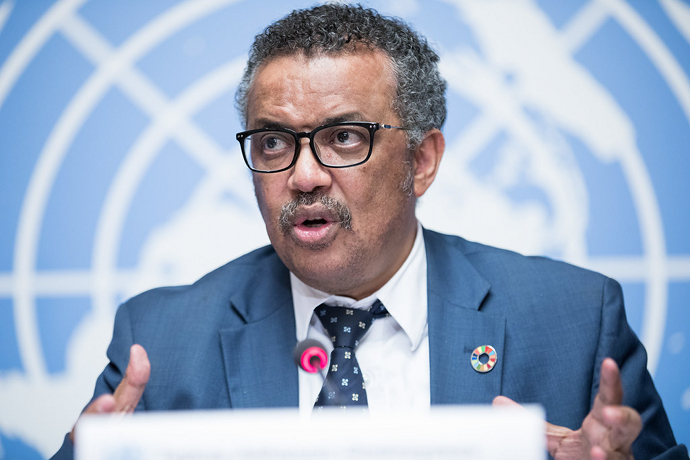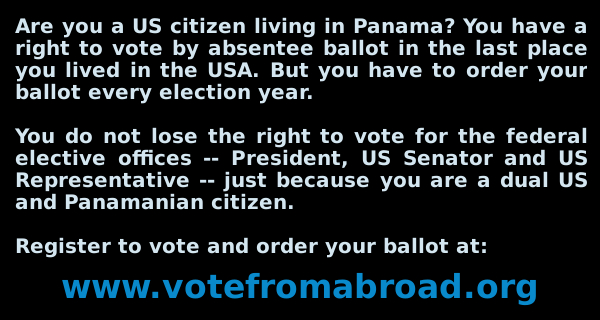World Health Organization Director-General Tedros Adhanom Ghebreyesus. UN photo.
With determination to triumph
over this common threat
by Dr. Tedros, PhD
My sisters and brothers,
As you know, this year is the International Year of the Nurse and the Midwife.
This Assembly was intended to be a moment of recognition for the incredible contribution that nurses and midwives make every day, in every country.
The pandemic has robbed us of that opportunity. But it has only served to illustrate why nurses, midwives and all health workers are so important.
Nurses and midwives have been on the frontlines of the fight against COVID-19, putting themselves in harm’s way. Many have made the ultimate sacrifice in service of humanity.
Last month, WHO published the first State of the World’s Nursing report.
It shows that the world is facing a shortfall of six million nurses to achieve and sustain universal health coverage.
But it also provides a roadmap for governments to invest in nursing, to fill that gap and progress towards universal health coverage. Health for all.
Now more than ever, the world needs nurses and midwives.
Please join me, wherever you are, in standing to show your appreciation for these true health heroes.
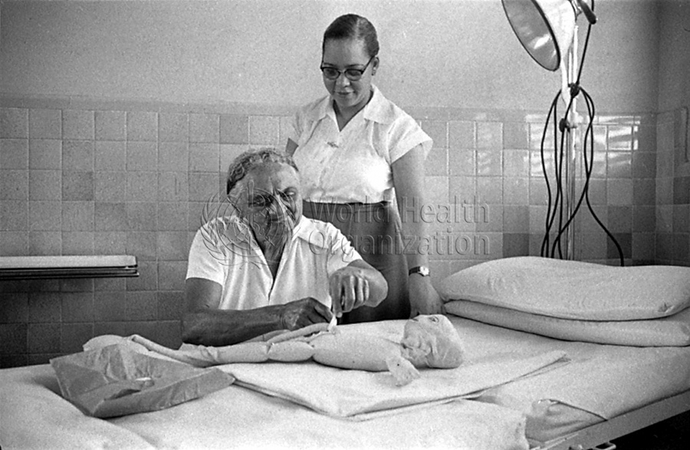
Here, in 1958 in La Chorrera, the WHO assisted the Government of Panama to strengthen rural health services and to develop effective methods of health administration suited to the social, economic and cultural needs of the population. Nurse Ethel Springer is helping to update the skills of rural midwife Dona Lola, 73 years old, by practicing umbilical cord severance on a rag doll. WHO photo.
We have come together as the nations of the world to confront the defining health crisis of our time.
We come in grief for those we have lost.
We come with concern for those still fighting for their lives.
We come with determination to triumph over this common threat.
And we come with hope for the future.
The world has confronted several pandemics before. This is the first caused by a coronavirus.
This a dangerous enemy, with a dangerous combination of features: this virus is efficient, fast, and fatal.
It can operate in the dark, spread silently if we’re not paying attention, then suddenly explode if we aren’t ready. And moves like a bushfire.
We have seen the same pattern repeated in cities and countries the world over.
We must treat this virus with the respect and attention it deserves.
More than fpur-and-a-half million cases of COVID-19 have now been reported to WHO, and more than 300,000 people have lost their lives.
But numbers don’t even begin to tell the story of this pandemic.
Each loss of life leaves a scar for families, communities and nations.
The health impacts of the pandemic extend far beyond the sickness and death caused by the virus itself.
The disruption to health systems threatens to unwind decades of progress against maternal and child mortality, HIV, malaria, tuberculosis, noncommunicable diseases, mental health, polio and many other of the most urgent health threats.
And yet this is so much more than a health crisis.
Lives and livelihoods have been lost or upended.
Hundreds of millions of people have lost their jobs.
Fear and uncertainty abound.
The global economy is headed for its sharpest contraction since the Great Depression.
The pandemic has brought out the best – and worst – of humanity: Fortitude and fear; solidarity and suspicion; rapport and recrimination.
This contagion exposes the fault lines, inequalities, injustices and contradictions of our modern world.
It has highlighted our strengths, and our vulnerabilities.
Science has been hailed and scorned.
Nations have come together as never before, and geopolitical divisions have been thrown into sharp relief.
We have seen what is possible with cooperation, and what we risk without it.
The pandemic is a reminder of the intimate and delicate relationship between people and planet.
Any efforts to make our world safer are doomed to fail unless they address the critical interface between people and pathogens, and the existential threat of climate change that is making our earth less habitable.
For all the economic, military and technological might of nations, we have been humbled by this very small microbe.
If this virus is teaching us anything, it’s humility. Time for humility.
Six months ago, it would have been inconceivable to most that the world’s biggest cities would fall eerily quiet; that shops, restaurants, schools and workplaces would be closed; that global travel would grind to a standstill; that simply shaking hands could be life-threatening.
Terms once used only by epidemiologists, like “reproduction number,” “physical distancing” and “contact tracing” have become common parlance.
In less than five months, the pandemic has encircled the globe.
All countries have faced challenges in coming to grips with this virus, rich and poor, large and small.
Low-income countries, small island developing states and those suffering from violence and conflict are trying to confront this threat in the most challenging of circumstances.
How do you practice physical distancing when you live in crowded conditions?
How do you stay at home when you have to work to feed your family?
How do you practice hand hygiene when you lack clean water?
Some countries are succeeding in preventing widespread community transmission.
“Some have issued stay-at-home orders and imposed severe social restrictions to suppress community transmission.
Some are still bracing for the worst.
And some are now assessing how to ease the restrictions that have exacted such a heavy social and economic toll.
WHO fully understands and supports the desire of countries to get back on their feet and back to work.
It’s precisely because we want the fastest possible global recovery that we urge countries to proceed with caution.
Countries that move too fast, without putting in place the public health architecture to detect and suppress transmission, run a real risk of handicapping their own recovery.
Early serology studies are painting a consistent picture: even in the worst-affected regions, the proportion of the population with the tell-tale antibodies is no more than 20 percent, and in most places, less than 10 percent.
In other words: the majority of the world’s population remains susceptible to this virus.
The risk remains high and we have a long road to travel.
Over the past few months, we have learned an enormous amount about how to prevent infections and save lives.
But there is no single action that has made the difference.
Not testing alone. Not contact tracing alone. Not isolation, quarantine, hand hygiene or physical distancing alone.
The countries that have done well have done it all.
This is the comprehensive approach that WHO has called for consistently.
There is no silver bullet. There is no simple solution. There is no panacea. There is no one-size-fits-all approach.
It takes hard work, fidelity to science, learning and adapting as you go, and difficult decisions, of course.
But there are many common components that must be part of every national strategy:
- A whole-of-government and whole-of-society response that engages and empowers people and communities to keep themselves and others safe;
- The commitment and capacity to find, isolate, test and care for every case, and trace and quarantine every contact;
- And special attention to vulnerable groups like people living in nursing homes, refugee camps, prisons and detention centers.
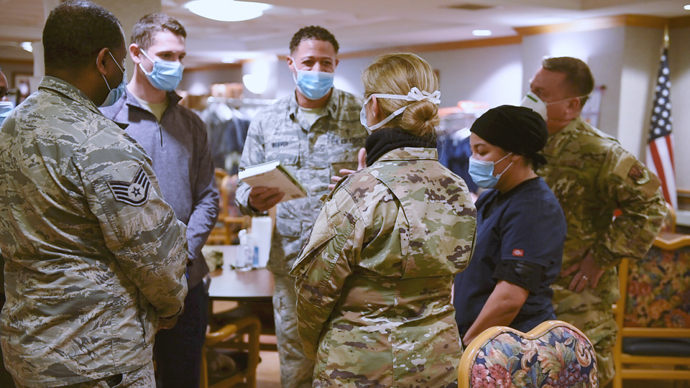
Military chaplains gather at the Holyoke Soldiers Home in Massachusetts, where dozens of veterans died as COVID-19 swept through the facility. Massachusetts Air National Guard photo.
Since day one, WHO has stood shoulder-to-shoulder with countries in these darkest of hours.
WHO sounded the alarm early, and we sounded it often.
We notified countries, issued guidance for health workers within 10 days, and declared a global health emergency — our highest level of alert — on the 30th of January. At the time, there were less than 100 cases and no deaths outside China.
We have provided technical guidance and strategic advice, based on the latest science and experience.
We have supported countries to adapt and implement that guidance.
We have shipped diagnostics, personal protective equipment, oxygen and other medical supplies to more than 120 countries.
We have trained more than 2.6 million health workers, in 23 languages.
We have driven research and development, through the Solidarity Trial.
We have called for equitable access to vaccines, diagnostics and therapeutics through the ACT Accelerator.
We have informed, engaged and empowered people.
We have fought the infodemic, combating myths with reliable information.
And we have called consistently for the two essential ingredients for conquering this virus: national unity and global solidarity.

Uh huh. A vast conspiracy to “control you” by creating an epidemic. A sinister plot involving the world’s nearly 200 governments, some of them at war with one another. Some of the alleged conspirators hate each other, and if they could control you would have you do very different things. But in a world of “alternative facts,” paranoia sells. Such is the nature of the infodemic.
We all have lessons to learn from the pandemic.
Every country and every organization must examine its response and learn from its experience.
WHO is committed to transparency, accountability and continuous improvement. For us, change is a constant.
In fact, the existing independent accountability mechanisms are already in operation, since the pandemic started.
The Independent Oversight Advisory Committee has today published its first report on the pandemic, with several recommendations for both the Secretariat and Member States.
In that spirit, we welcome the proposed resolution before this Assembly, which calls for a step-wise process of impartial, independent and comprehensive evaluation.
To be truly comprehensive, such an evaluation must encompass the entirety of the response by all actors, in good faith.
So, I will initiate an independent evaluation at the earliest appropriate moment to review experience gained and lessons learned, and to make recommendations to improve national and global pandemic preparedness and response.
But one thing is abundantly clear. The world must never be the same.
We do not need a review to tell us that we must all do everything in our power to ensure this never happens again.
Whatever lessons there are to learn from this pandemic, the greatest failing would be to not learn from them, and to leave the world in the same vulnerable state it was before.
If there is anything positive to come from this pandemic, it must be a safer and more resilient world.
This is not a new message.
Reviews after SARS, the H1N1 pandemic and the West African Ebola epidemic highlighted shortcomings in global health security, and made numerous recommendations for countries to address those gaps.
Some were implemented; others went unheeded.
The SARS outbreak gave rise to the revision of the International Health Regulations, in 2005.
The H1N1 pandemic saw the creation of the Pandemic Influenza Preparedness Framework.
And the Ebola outbreak of 2014 and 15 led to the establishment of the Pandemic Emergency Financing Facility, the WHO Emergencies Program and the Independent Oversight Advisory Committee.
The world doesn’t need another plan, another system, another mechanism, another committee or another organization.
It needs to strengthen, implement and finance the systems and organizations it has – including WHO. Many leaders who have spoken today have raised these issues: implementing, supporting WHO, and financing.
The world can no longer afford the short-term amnesia that has characterized its response to health security for too long.
The time has come to weave together the disparate strands of global health security into an unbreakable chain – a comprehensive framework for epidemic and pandemic preparedness.
The world does not lack the tools, the science, or the resources to make it safer from pandemics. What is has lacked is the sustained commitment to use the tools, the science and the resources it has.
That must change, and it must change today.
Today I am calling on all nations to resolve that they will do everything it takes to ensure that the 2020 coronavirus pandemic is never repeated.
I am calling on all nations to invest in strengthening and implementing the many tools at our disposal – especially the global treaty that underpins global health security: the International Health Regulations.
To be successful, we must all commit to mutual ownership and accountability.
One way to do that, proposed by the Africa Group last year, is through a system of universal periodic review, in which countries agree to a regular and transparent review of each nation’s preparedness.
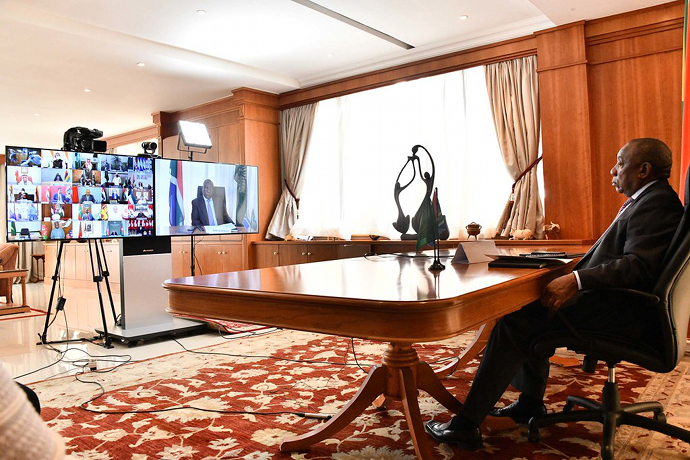
South Africa’s President Cyril Ramaphosa attend the online 2020 World Health Assembly. The novel coronavirus pandemic is so severe it was considered too dangerous to gather the world’s health and political authorities in one place. South African government photo.
Since my election at this assembly three years ago, I have made a priority of transforming WHO into an organization that is agile and responsive, focused on outcomes and impact.
Two years ago, I presented – and this Assembly approved – the cornerstone of our transformation: WHO’s 13th General Program of Work.
At its heart are the ambitious “triple billion” targets:
- 1 billion more people enjoying better health and well-being.
- 1 billion more people benefiting from universal health coverage;
- And 1 billion more people better protected from health emergencies.
These are the targets that the world has set itself to achieve by 2023, to get on track and stay on track for the Sustainable Development Goals.
The WHO Results Report, launched today, provides a comprehensive picture of what WHO, its Member States and partners have achieved in the past two years.
On healthy populations, we’ve made important progress to improve the air people breathe, the food they eat, the water they drink, the roads they use, and the conditions in which they live and work are the most important, actually, in bringing health.
On universal health coverage, the world came together last year to endorse the political declaration on UHC – an unprecedented commitment to the ideal of health for all.
We have expanded access to prevention, testing and treatment for HIV, tuberculosis, malaria, hepatitis C, hypertension, diabetes, cancer and more.
And to keep the world safe, WHO has investigated and, when necessary, responded to more than 900 events in 141 countries.
That includes coordinating a huge and complex response to the Ebola outbreak in the Democratic Republic of the Congo, complicated by violence, a mobile population and a weak health system.
All of these efforts have been supported by an increased focus on science, evidence and data.
In the coming year, we will launch the WHO Academy to provide training for millions more health workers around the world.
And the WHO Foundation will be launched in the next few weeks, to broaden WHO’s donor base.
I am proud of the progress WHO has made in these and many other areas.
However, much work remains to be done.
Even before COVID-19, the world was off track for the SDGs.
The pandemic threatens to set us back even further.
It exploits and exacerbates existing gaps in gender equality, poverty, hunger and more.
Already we have seen the impact of the pandemic on immunization campaigns and many other essential health services.
But the challenges we face cannot be an excuse to abandon hope of achieving the “triple billion” targets or the SDGs.
On the contrary, they must serve as motivation to redouble our efforts, and to work aggressively in pursuit of the healthier, safer, fairer world we all want.
Although COVID-19 is rightly the focus of the world’s attention now, we must not lose focus on sustaining and accelerating other initiatives that have saved millions of lives in recent years – like the work of Gavi, the Vaccine Alliance.
Over the past 20 years, Gavi has supported countries to vaccinate 760 million children, preventing more than 13 million deaths.
Gavi has set an ambitious goal to immunize 300 million more children with 18 vaccines by 2025.
We call on the global community to support Gavi’s upcoming replenishment, hosted by the UK, to ensure that it is fully funded for this life-saving work.
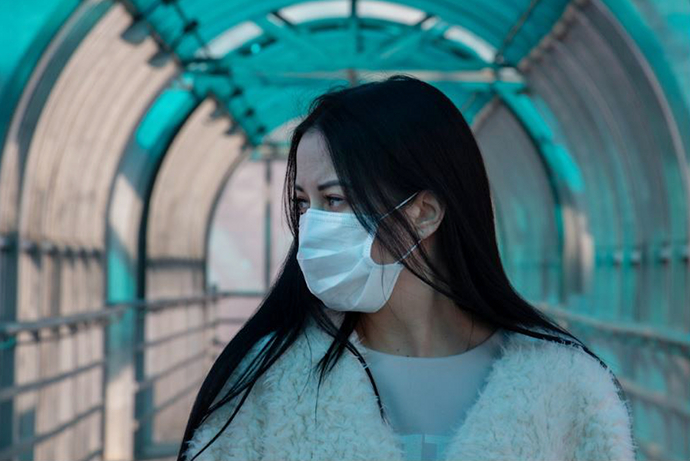
For the time being, the new normal. Photo cc fromwww.vperemen.com (Russia) .
Last week, my friend Dr Suwit from Thailand sent me a message. This is what he said:
“Actually, COVID has demonstrated how WHO’s “triple billion” goals are interconnected.
“Universal health coverage plays big roles in the COVID response in many countries.
“And healthy lives mean less deaths from COVID.”
I couldn’t agree more.
COVID-19 is not just a global health emergency, it is a vivid demonstration of the fact that there is no health security without resilient health systems, or without addressing the social, economic, commercial and environmental determinants of health.
More than ever, the pandemic illustrates why investing in health must be at the center of development. I will repeat this: More than ever, the pandemic illustrates why investing in health must be at the center of development.
We’re learning the hard way that health is not a luxury; it’s a necessity. It is a necessity.
Health is not a reward for development; it is a prerequisite.
Health is not a cost; it’s an investment.
Health is a pathway to security, prosperity and peace.
My brothers and sisters,
40 years ago, the nations of the world came together under the banner of WHO to rid the world of smallpox.
They showed that when solidarity triumphs over ideology, anything is possible.
The COVID-19 pandemic is posing a similar threat – not just to human health, but to the human spirit.
We have a long road ahead in our struggle against this virus.
The pandemic has tested, strengthened and strained the bonds of fellowship between nations.
But it has not broken them.
The COVID-19 pandemic is asking us two fundamental questions:
- What sort of world do we want?
- And what sort of WHO do we want?
The answer to the first question will determine the answer to the second.
Now more than ever, we need a healthier world.
Now more than ever, we need a safer world.
Now more than ever, we need a fairer world.
Healthy, safe and fair.
And now more than ever, we need a stronger WHO.
There is no other way forward but together.
During this quarantine Claro has increased the cost of Internet service for The Panama News by at least six-fold. To help with that, there are two things you might do:
1: Send money to the The Panama News Internet number, which is 62757611, via Ding at https://www.ding.com/
2. Buy Claro prepaid phone cards, scratch off the covering on the code numbers and email those numbers to fund4thepanamanews@gmail.com
Contact us by email at fund4thepanamanews@gmail.com
To fend off hackers, organized trolls and other online vandalism, our website comments feature is switched off. Instead, come to our Facebook page to join in the discussion.
These links are interactive — click on the boxes

